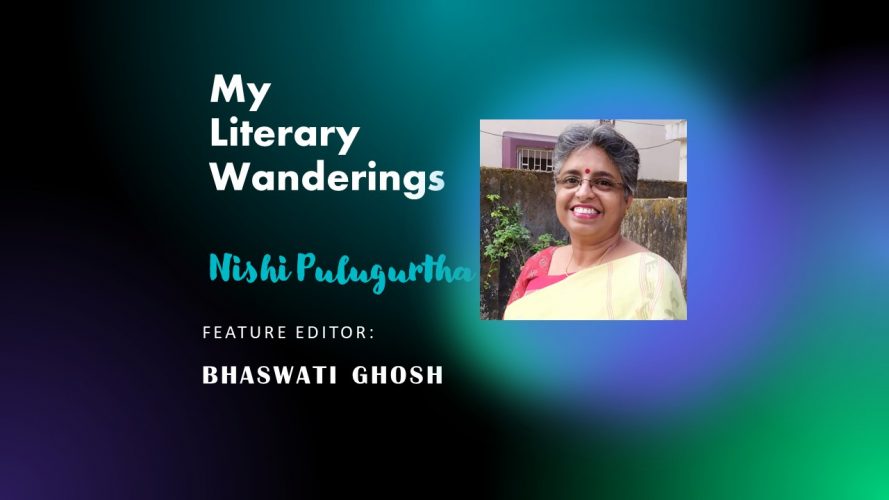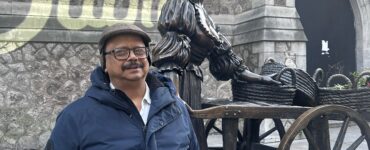My first encounter with writing began when I was in junior school. We made annual trips from Calcutta to Kakinada (in Andhra Pradesh) and Hyderabad (now in Telangana) to visit my grandmothers, uncles, aunts and cousins during the summer and winter vacations. We made this journey to Kakinada by the Madras Mail as it was then called (it has been renamed the Chennai Mail now) – a journey of eighteen hours. Later when we travelled to Hyderabad as my grandmother relocated to the city, it was an even longer journey by the East Coast Express – about 36 hours, and the train never failed to arrive late, after midnight and into the wee hours of morning at Secunderabad station. Amma and Appagaru had a difficult time dealing with a hyperactive child who needed to be kept engaged on the long train journeys.
My sister and I were given notebooks at the start of the journey. We had to use this notebook to record what we encountered on the train journey. We were also given story books that we were expected to read in the train. We looked forward with excitement to these trips that would take us to my Ammamma’s house. My father asked us to write down the names of stations, people and things we saw and what we felt about them. There was a time when I could rattle off the names of all the stations from Howrah to Secunderabad without making a single mistake and in the correct sequential order. The sequence is a bit rusted in my mind right now but I think I do remember some of the names. My father asked us to write about what we saw and observed. Initially they were just listings and jottings, however, later on they became more descriptive. He read them leisurely once we got back home and gave his opinion, suggestions and feedback. That habit of observing, recording, reading and writing has remained with me ever since.
I began my writing life by writing on travel. As I look back on how it all began, I believe these notebook jottings and notes, the serious readings that Appagaru did of them and all the feedback I received helped fashion my writing on travel. Added to that was the immense pleasure and delight that I derived from travel. I owe that to Amma who loved travelling and who saw to it that we travelled every year to places known or little known, mostly historical and architecturally important ones, apart from visiting folks at Hyderabad. Appagaru was my first reader too when I began to write and also my best critic. It began in the pages of The Statesman, a newspaper published from Calcutta. It was he who noted that I should write fiction and that was how it all began. It wasn’t a regular flow – mostly long pauses with a little bit of writing. My first published story, I was told was too grave and sombre, too meditative – it was published online at a time when there weren’t too many online magazines.
There is no pattern, no real routine that I follow. I still have a notebook where I make short notes that could possibly be worked into stories at some point of time. Many of them just remain points and short notes – maybe they might find their way back into my mind in new ways. Many find their way into drafts and just remain drafts – disorganized thoughts that lie scattered here and there.
Poetry was something I wrote in private; I kept my poems away most of the time. A few lines here and there and then nothing. My association with the Intercultural Poetry and Performance Library (IPPL) led me to write much more poetry than I did and encouraged me to publish them too. I experiment with styles and forms – in the pandemic I thought of working on form poems and enjoyed them thoroughly. It was like an exercise that I did, something that allowed me to take my mind away from stress, one that saw thoughts and words coalesce in just the right form.
On a conference trip to the US, I stayed with friends in New York. They were the founding editors of an online magazine Café Dissensus. It was some years then that my mother had been diagnosed with Alzheimer’s Disease and they suggested I write about it, about my personal experiences at care giving. I went on to write several essays on the condition. However, my first piece in the magazine was not on Alzheimer’s disease but on how one got to see a slice of life in a train compartment – I took the local train to work and what I saw there and my experiences of life unfolding in the ladies’ compartment of the Dankuni local became my subject. That was how I began to write non-fiction and memoir.
During the pandemic, I began to write on food, on recipes from Amma’s kitchen, a Telugu kitchen in Calcutta and little snippets of my growing up in that city that I shared on social media. Friends were keen on trying out new recipes and I found a new subject to write about.
I write when I feel like it and I write because I enjoy it. There is no definite design, absolutely no pattern. Random keying in of thoughts is how I would like to describe it all.
BIO
Nishi Pulugurtha is an academic and writer based in Kolkata. Her publications include a monograph on Derozio (2010), a collection of essays on travel, Out in the Open (2019), an edited volume of essays on travel, Across and Beyond (2020) and a volume of poems, The Real and the Unreal and Other Poems (2020), and a collection of short stories, The Window Sill (2021). A second volume of poems is forthcoming from Writers Workshop, Kolkata. She also writes on Alzheimer’s Disease.
*









Absolute pleasure to note the contents and events unravel.wow.
Thank you so much for reading.